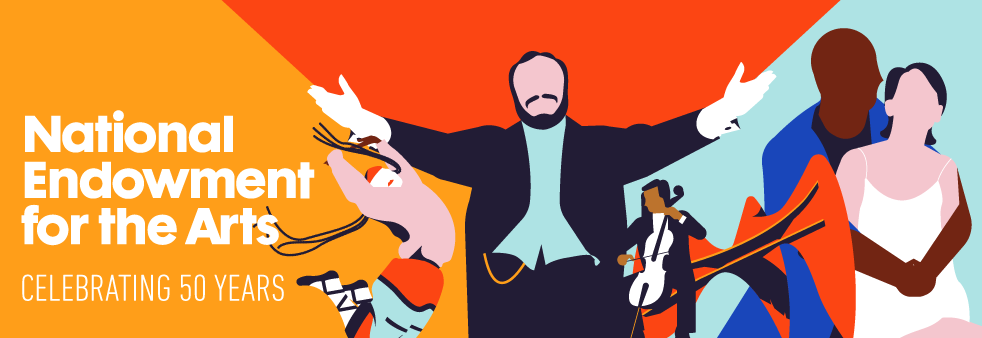 From www.arts.gov/
From www.arts.gov/
It’s federal budget time and, as usual, the National Endowment for the Arts is under attack. Their heads filled with images of obscene art, effete gallery-goers and overtaxed single mothers, conservatives are gunning for the straight-out elimination of the 50 year old program. No money, no arts funding. Period.
No matter that the $148 million agency budget is, by federal standards, awfully small. Or, that each dollar in NEA grants is matched by other jurisdictions. Or, that it keeps a broad network of arts education going in areas that can’t otherwise afford it. Religious and cultural conservatives don’t want tax money going for secular humanist undertakings. More importantly, devotees of Milton Friedman and Ayn Rand want the government out of…well, whatever they want it out of these days.
But they – and most of us – overlook the fact that although the arts are cultural, they are also a very large industry. That industry creates work and jobs and consumer spending. And since the arts underlie a nearly trillion-dollar job and revenue machine, the only reason to eliminate it is cultural animus… and an indifference to the livelihoods of millions. If you’re doubtful about arts-as-industry, consider these numbers:
- Over 400, 000 people work in and for museums, more than in the pro sports industry.
- There are at least 100,000 post secondary art, drama and music teachers, twice as many as all logging jobs.
- There are at least five times as many active members of SAG-AFTRA as there are of the United Mine workers.
Furthermore, the NEA provides critical R&D for this economic powerhouse. In this respect, NEA joins agencies like Commerce, Energy and Education, providing millions in grants to stimulate economic activity. Here, this means support for artists of all kinds, and for audience development. And, the 2000 or so annual NEA grants – few of which go to individuals – essentially go to artistic development that might not otherwise receive sufficient support to exist. The NEA is the largest single funder in the field.
Conservatives are able to flame antipathy to the NEA because much of the art produced through its grants isn’t terribly pleasing to many people. But that’s because its projects are nascent and experimental, and most experiments, by definition, fail. That’s how artists learn.
Out of this culture of learning and experimentation come both the cultural currents and the skilled artists who can then, if they wish, go on to add to more popular arts: TV, graphics, major theater, popular fiction, video games and more.
And while those industries may often be better known for celebrities and billion dollar box office takes, the entire industry rests on a living network of actors, writers, artists and musicians who create the ultimately polished entertainment we love and hate. And where do those creative types come from? Art schools, regional theaters, local musical productions, fiction workshops. The kind of ventures supported by NEA, along with state and local agencies.
So, while support for the arts helps people who go to poetry readings, concerts and galleries, it also helps those who don’t. The American people consume a lot of mass culture and entertainment. According to the federal government, arts and cultural production contributed around $700 billion to the U.S. economy. And the NEA said that in 2013, the arts and cultural sector employed 4.7 million wage and salary workers, earning $339 billion. And, cultural production is among our top exports.
So if the new administration is really concerned about jobs, the NEA ought to be getting even more money. Even if artists themselves may live precarious financial lives, the arts and media sector remains a flourishing area where many people can earn a decent living.
So, whether you want to think it or not, the NEA funds economic activity, and the only reason to eliminate it is sheer cultural animus. And in doing so, it weakens an important industry and threatens jobs. That’s just dumb.
Alec Dubro is a former President of the National Writers Union and lives in Washington, DC.

 NWU is the sole provider of IFJ Press Passes to freelance journalists in the U.S.
NWU is the sole provider of IFJ Press Passes to freelance journalists in the U.S.